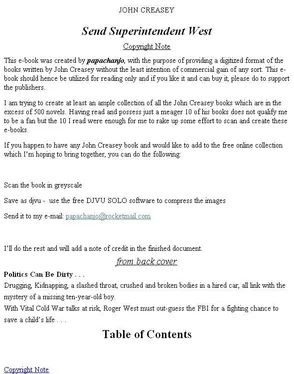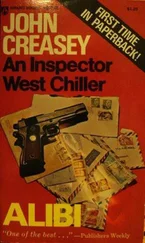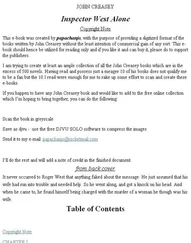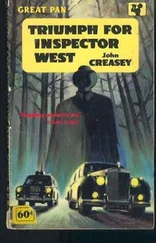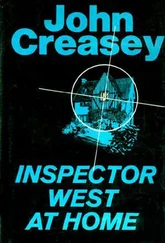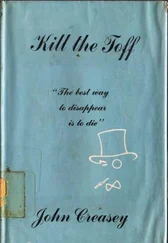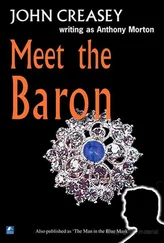John Creasey - Send Superintendent West
Здесь есть возможность читать онлайн «John Creasey - Send Superintendent West» весь текст электронной книги совершенно бесплатно (целиком полную версию без сокращений). В некоторых случаях можно слушать аудио, скачать через торрент в формате fb2 и присутствует краткое содержание. Жанр: Старинная литература, на русском языке. Описание произведения, (предисловие) а так же отзывы посетителей доступны на портале библиотеки ЛибКат.
- Название:Send Superintendent West
- Автор:
- Жанр:
- Год:неизвестен
- ISBN:нет данных
- Рейтинг книги:3 / 5. Голосов: 1
-
Избранное:Добавить в избранное
- Отзывы:
-
Ваша оценка:
- 60
- 1
- 2
- 3
- 4
- 5
Send Superintendent West: краткое содержание, описание и аннотация
Предлагаем к чтению аннотацию, описание, краткое содержание или предисловие (зависит от того, что написал сам автор книги «Send Superintendent West»). Если вы не нашли необходимую информацию о книге — напишите в комментариях, мы постараемся отыскать её.
Send Superintendent West — читать онлайн бесплатно полную книгу (весь текст) целиком
Ниже представлен текст книги, разбитый по страницам. Система сохранения места последней прочитанной страницы, позволяет с удобством читать онлайн бесплатно книгу «Send Superintendent West», без необходимости каждый раз заново искать на чём Вы остановились. Поставьте закладку, и сможете в любой момент перейти на страницу, на которой закончили чтение.
Интервал:
Закладка:
Marino moved round clumsily. Roger looked into a face so suffused with hatred that he himself could neither move nor speak. He didn’t know how long he stood there. He was vaguely aware that motorists were approaching, warily because of the guns in his hand and in the driver’s; and he saw, as if it were happening a long way off and had nothing to do with him, that the motorists stopped dead when they saw Marino.
At last Marino’s gaze shifted, and he looked past Roger towards the orchard and the men who bent over Lissa. Roger didn’t know that they were lifting her. He saw the transformation; it was like watching a devil turn into a saint. All hatred died. Yearning showed in Marino’s eyes, and his face was touched with a softness that matched a mother’s for a child; a lover’s for his love.
He didn’t speak or need to speak. Roger knew why he had succumbed to the red surge of rage, why he had changed now.
• • •
A man said: “Put that gun down, will you?”
“Don’t get too near, Hank,” another warned.
“You heard me — put that gun down.”
Roger forced himself to look away from Marino and saw the motorists, two of them, Hank probably the nearer, a stripling wearing a peaked skull cap and a red lumber-jacket, whose long jaw was thrust forward and who was edging closer.
Roger swallowed.
“Has anyone called the police?” he asked. His voice was husky, but the words seemed to carry reassurance. He dropped the gun into his pocket, put a hand on Marino’s shoulder and said: “I’ll look after her.” He hurried away, ignoring protests from Hank and his cautious friend.
Lissa was lying on her back, with a folded coat beneath her head, hair bared to the bright sun, body limp but eyes wide open. One of the men with her straightened up and hurried towards the road, glancing at Roger without stopping. But he called:
“Must get a doctor, quick.”
The other man was speaking to Lissa.
“Just stay where you are, you’ll be okay. But don’t move, honey, don’t move.”
Lissa didn’t move.
She was looking towards Roger, recognized him, smiled as he drew near. She looked pale, but didn’t seem to be in pain. Blood stained her beige shirt-blouse, near the waist, and seemed to be spreading, and the men by her side stared down helplessly. If the blood came from one side it didn’t matter, if it sprang from a wound in the middle of her body, it might be deadly.
“I’m all right, Roger,” she said. “See, I’m learning the correct thing to say.”
“Now you keep quiet.” He smiled at her as he might at Janet, brusquely affectionate. “Tony nearly pushed Pullinger’s nose to the back of his head.” He stripped off his coat, knelt down and laid it on the ground, then gently tucked one side beneath her. The back of his hand came away red from the patch of blood. “Does it hurt much?”
“It hardly hurts at all. It’s beginning to ache a little.”
He unzipped her skirt at the side near the wound, his movements quick yet gentle. She wore a pair of white nylon panties and a narrow suspender belt; skin and belt were soaked with blood, and he still couldn’t tell where the wound was.
“It fastens on the other side,” Lissa said.
“You’ll have to buy yourself a new belt.” Roger felt for his knife; of course, Gissing’s men must have taken it. “Have you a knife?” He held out his hand, and the man fumbled in his pockets and produced a big one, opened the blade and thrust the handle towards Roger. “Thanks.” Roger cut the belt carefully, and it sagged away. Blood pumped out of the wound and ran over his hand. The man gasped in horror. Roger glanced up at Lissa’s eyes, seeing the anxiety which lurked in their honey-coloured depths.
“It won’t kill you,” he said, steadily, “it’s too far to one side.” But it could. He took a clean handkerchief from his pocket and swabbed the wound, until he could see the actual hole in the flesh. “Handkerchief,” he snapped to the other man, who began to fumble helplessly in his pocket. Slipping off his jacket, Roger unbuttoned his shirt, took it off, flung it at the man and said: “Tear it, fold it into a wad.” He pressed his fingers against Lissa’s flesh, found the bone nearest the artery, pressed tightly. He had to staunch the flow, or she would bleed to death.
“A doctor, too,” Lissa mocked.
“You don’t need a doctor,” he said. “You need a keeper. Lissa, one day I will — we all will tell you what we think about you. Just now, relax.”
The man gave him a wadded piece of shirt, but he didn’t use it at once. The bleeding had stopped, but would start again as soon as he released the pressure.
The wail of a siren came clearly through the air.
“Police or an ambulance,” Roger said to Lissa. “The ambulance will be here any minute, anyhow. You’re going to have a long rest, but you’ll be fine. There won’t be a scar where it matters.” The sun was warm on his arms and back, his fingers began to ache. “If you’d seen Tony,” he went on, “you would have thought his world had come to an end. When he thought you —”
The wailing was much nearer now, a mournful herald of rescue or of doom.
Lissa said: “I know just how Tony feels. Is he hurt?”
“If anyone’s hurt him,” said Roger, “you have. Not that I blame you.”
She didn’t answer.
The wailing pierced his ears and stopped, and more wailing sounded from farther away. The first was a police siren, the second the ambulance. A young doctor took over quickly, and there was nothing more for Roger to do. The doctor grunted as if satisfied with what had been done so far.
Roger smiled down, and said easily:
“I’ll see you soon, we’ll get the other job finished now. Don’t worry, Lissa.”
He turned away and walked quickly back to the Lincoln and the crowd around it A traffic cop was talking to Marino, aggressively at first, then with a swift somersault into deference. Marino had conquered emotion, there was a pale copy of his smile for Roger — and a question shouting from his eyes.
“A month in hospital, I should think,” said Roger.
Marino drew in his breath, and relief glowed in his eyes.
“That’s wonderful,” he said. “Wonderful. Do you know how to get these folk away from here?” He waved to the pressing crowd, and cops started bellowing. Pullinger had already been taken out of the car and was lying, unconscious, by the roadside. He would probably never recognize his face again. “Get in behind me,” Marino said. Roger obeyed, and the driver started the engine, one of the traffic cops clearing a path. They drove slowly through the crowd. Marino looked out of the window at Lissa and the doctor bending over her, the ambulance men waiting for instructions. He waved. Lissa’s head was turned towards him, and she smiled. Marino dropped his hand, stared straight ahead for a minute, then drew a great breath and spoke in a clear voice. “Listen, Roger. Pullinger wasn’t as good as he thought, our men were suspicious. No one was drawn away from the farmhouse, but the house Pullinger named was cordoned off as well. Now we’ll raid —”
“Not your way nor my way,” Roger said sharply. “Stop, driver.” The man braked, and Marino half-turned his head, ready to lay down the law. “I’m going up to that farmhouse with as many men as you like,” said Roger. “We’ll take Pullinger’s car. Gissing will recognize it, and it will fool him. I can wear Pullinger’s coat and hat, too.”
Marino ran thumb and fingers over his chin.
“Go and get that Chevy,” he said. “My God, you British are stubborn! I’ll go on. We’ll meet at the restaurant, a mile along the road.
• • •
Pullinger had said that Gissing would wait twenty minutes, but that could have been bluff. It could have been in earnest, too. The tumult of the hold-up was stilled, but a new storm blew, and Roger’s mind’s-eye picture of Ricky Shawn’s face hid everything else. The bright, frightened eyes and the plastered lips, the frail arms with the cruel steel bracelets round them, were all vivid. There was nothing Gissing would not do. It had been a mistake to say that he would take Marino’s men in the car, he ought to go alone. Alone, he might be able to bargain; with others, Gissing would know that the end was inevitable and might kill for the sake of killing. These thoughts pressed sharp against Roger’s mind as he stood outside the restaurant by the side of the Lincoln, with several clean-limbed men standing nearby, waiting for Marino’s orders. Marino was talking to the man in charge.
Читать дальшеИнтервал:
Закладка:
Похожие книги на «Send Superintendent West»
Представляем Вашему вниманию похожие книги на «Send Superintendent West» списком для выбора. Мы отобрали схожую по названию и смыслу литературу в надежде предоставить читателям больше вариантов отыскать новые, интересные, ещё непрочитанные произведения.
Обсуждение, отзывы о книге «Send Superintendent West» и просто собственные мнения читателей. Оставьте ваши комментарии, напишите, что Вы думаете о произведении, его смысле или главных героях. Укажите что конкретно понравилось, а что нет, и почему Вы так считаете.
